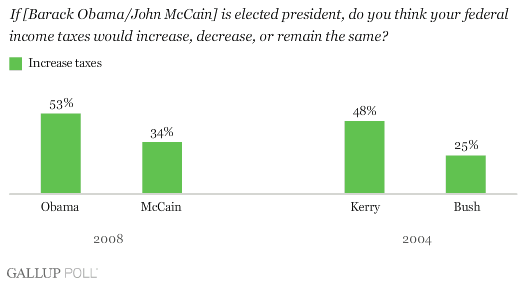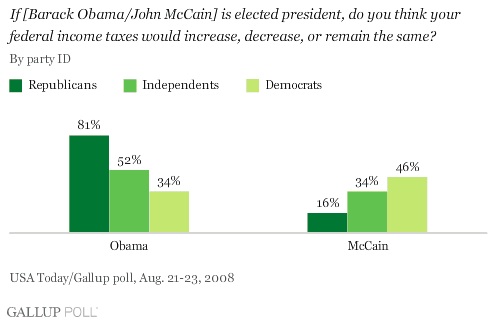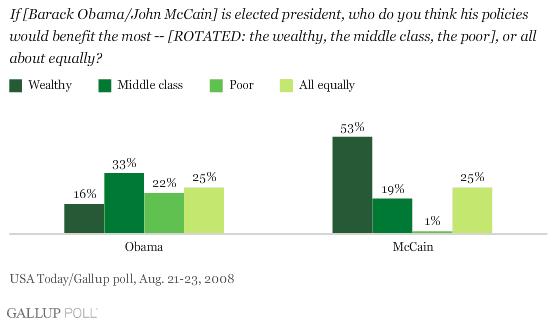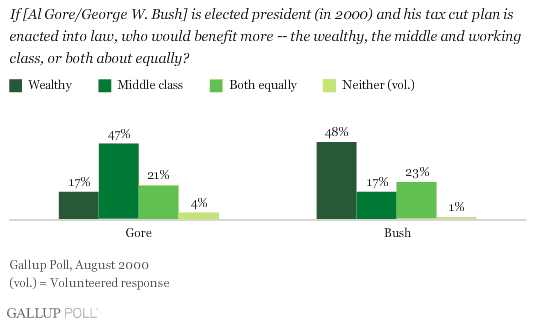PRINCETON, NJ -- Fifty-three percent of Americans expect their federal income taxes to increase if Barack Obama is elected president, while 34% think they would increase if John McCain gets the job -- both of which are higher than expectations were for their counterparts in the 2004 election.

Many Independents Think Both Obama and McCain Will Increase Taxes
Given the current economic environment, one might think that the last thing the presidential contenders would be thinking about -- let alone verbalizing -- would be their intention to raise federal income taxes. In fact, McCain has pledged to renew the tax cuts George W. Bush instituted, and Obama has said he would raise taxes on the wealthiest but would provide a tax cut to middle-class Americans. Therefore, it may be somewhat surprising that so many Americans think their federal taxes will go up, regardless of whether Obama or McCain is elected. And while the respective percentages are higher for this year's candidates than they were in 2004, the gap between the two contestants of 19 points is actually smaller than the 23-point gap that year.
Republicans are overwhelmingly convinced that Obama will increase their taxes, with 81% stating such an expectation, compared to 52% of independents and 34% of Democrats. In sharp contrast, only 16% of Republicans think their taxes will increase if McCain is elected president, compared to 34% of independents and 46% of Democrats. While party affiliation clearly plays a role in the way Democrats and Republicans view potential tax increases, a substantial percentage of independents think their federal taxes will increase no matter who wins.

Economic Groups Perceived to Benefit Most in an Obama or McCain Presidency
If Obama becomes president, 55% of Americans say they believe his policies will benefit the middle class (33%) or the poor (22%) the most, with 25% saying they'll benefit all groups equally and only 16% saying his policies would benefit the wealthy. In sharp contrast, if McCain is elected, 53% believe his policies will benefit the wealthy the most, with only 20% suggesting they will favor the middle class (19%) or the poor (1%), and 25% saying they will benefit all groups equally.

The public's view of these two candidates is little different from the perceptions of the Democratic and Republican candidates that existed in August 2000, when 47% of Americans felt Al Gore's policies would favor the middle class and 48% thought Bush's policies would favor the wealthy.

Commentary
Although Americans are more likely to say Obama, rather than McCain, will raise their taxes, they favor Obama as the candidate better able to handle taxes by 48% to 43%. In part, this may be because a majority of Americans see Obama's policies as benefiting the middle class and the poor the most, while a majority see McCain's policies as benefiting the wealthy. In turn, this could work against Mitt Romney, who has a Wall Street background, in the vice presidential stakes since McCain may want to avoid reinforcing this "favoring the wealthy" perception.
It is also possible that McCain's record of voting against the Bush tax cuts (although he now supports extending them) and his reputation as a "maverick" have some Americans believing -- contrary to what might be expected with a Republican in the White House -- he will raise federal income taxes if elected. In this regard, the fact that about one in three independents see a tax increase in a McCain presidency is something that might be of concern to the Republicans in the weeks ahead. In fact, how the candidates handle the tax issue in a time of recession may give voters significant insight into the fundamental economic policies of each candidate.
Survey Methods
Results are based on telephone interviews with 1,023 national adults, aged 18 and older and employed full- or part-time, conducted Aug. 21-23, 2008. For results based on the sample of employed adults, one can say with 95% confidence that the maximum margin of sampling error is ┬▒3 percentage points.
Interviews are conducted with respondents on land-line telephones (for respondents with a land-line telephone) and cellular phones (for respondents who are cell-phone only).
In addition to sampling error, question wording and practical difficulties in conducting surveys can introduce error or bias into the findings of public opinion polls.
To provide feedback or suggestions about how to improve ║┌┴¤═°.com, please e-mail feedback@gallup.com.
